Pope Francis stood out—strikingly so—in a world where material power and personal wealth are becoming more and more important. The former Archbishop of Buenos Aires made a decision that sent shockwaves around the world when he became pope in 2013: he refused to take the $32,000 monthly salary that popes are expected to receive. This choice was not merely symbolic; rather, it was firmly based on a philosophy that valued service over prestige and humility over hierarchy.

Pope Francis’s decision to decline a salary was not a silent one. This intentional change in tone immediately heralded a new era of Vatican leadership. The pontiff relied solely on Vatican-funded provisions for housing, transportation, and basic necessities rather than taking personal income. Even so, his estimated net worth by 2025 was $16 million, mostly from assets related to his job rather than personal wealth.
Pope Francis – Spiritual Leadership, Lifestyle, and Financial Profile
| Full Name | Jorge Mario Bergoglio |
|---|---|
| Papal Name | Pope Francis |
| Date of Birth | December 17, 1936 |
| Date of Death | April 8, 2025 (aged 88) |
| Nationality | Argentine |
| Papacy | March 13, 2013 – April 8, 2025 |
| Official Salary | $0 (Refused traditional $32,000/month entitlement) |
| Estimated Net Worth | $16 million (from papal assets and allowances) |
| Residence | Vatican City (Guesthouse Domus Sanctae Marthae) |
| Major Revenue Sources | Peter’s Pence, Vatican assets, private donations |
| Reference | www.economictimes.indiatimes.com |
How a Pope Without a Salary Kept Millions of Dollars in Assets
The papacy operates under a very different structure, even though the idea of a global leader with no salary seems unrealistic in most situations. The economy of Vatican City, which is frequently called the smallest sovereign state in the world, is incredibly effective and surprisingly adaptable. Investments, museum admission fees, and charitable donations provide its income.
Peter’s Pence, a worldwide collection of yearly contributions from Catholics for the Pope’s discretionary use, is one of the most reliable sources of this revenue. The United States, Germany, and Italy are the main contributors to this fund, which alone brings in about $27 million annually. These monies provide substantial institutional power that is still governed by the Pope, even though they are never used as personal wealth.
Pope Francis’s financial impact is both practical and philosophical within this framework. His $16 million net worth is not the product of capital projects or compensation, but rather the structural wealth inherent in his job. In addition to demonstrating his dedication to reform, he greatly decreased his chance of coming across as financially motivated by refusing a direct salary.
Leading with Less: An Intention-Based Lifestyle
Pope Francis’s stance was remarkably effective because of how consistently he lived out his decision, not just what he gave up. He opted to live in the modest Vatican guesthouse known as the Domus Sanctae Marthae instead of the opulent Papal Apartments in the Apostolic Palace. He frequently stressed modesty in his sermons, drove small cars like the Ford Focus, and wore simpler vestments on a regular basis.
These decisions were particularly obvious in the field of religious leadership, where public trust is frequently shaped by perception. The stark contrast between Francis and some of his more lavish predecessors gave his appeal for institutional humility more weight. His choice to lead without receiving personal income was not a token gesture; rather, it was a consistent, deliberate trend that contributed to the persuasiveness of his pontificate.
Overseeing the Holy See’s Financial Affairs
Pope Francis made an effort to clarify the Vatican’s historically murky finances by incorporating contemporary accountability instruments and advocating for internal transparency. He has led inquiries into financial mismanagement and advocated for audits of church properties and investment portfolios during the last ten years. Despite long-standing opposition, his reforms have significantly improved internal efficiency and public perception.
However, difficulties continued. Concerns regarding the Vatican’s long-term financial stability grew after it revealed a deficit of more than $90 million in 2023. In his typically candid response, Pope Francis warned of a “severe imbalance” in the Vatican’s pension fund and urged structural fixes rather than band-aid fixes. Despite being sobering, these cautions were typical of a leader who prioritized sustainable stewardship.
An Example of Financial Self-Control During an Excessive Period
Pope Francis’s economic example was especially pertinent in a time of growing corporate power and inequality. In a time when influencers profit from every aspect of their lives and CEOs receive multimillion-dollar bonuses, it seems both radical and novel for a leader—possibly one of the most well-known people in the world—to refuse payment.
His decision had contemporary resonance in addition to being strongly in line with Catholic social teaching. His pontificate became a model of moral leadership for young religious leaders, nonprofits, and reformers around the world. His unconventional yet successful approach to money served as a reminder that restraint can have unexpectedly strong effects and that influence does not need to be purchased.
